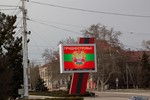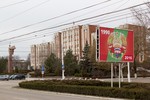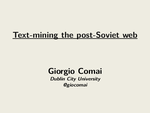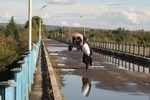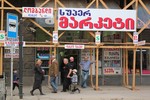Confidence Building by Any Other Name? Surpassing the Triple Bottleneck of Assistance to De Facto States
In spite of their contested nature, de facto states in the post-Soviet space engage in substantive external relations across a number of sectors, well beyond the dominant relationship they have with their patron. In recent years, confidence building programmes sponsored by the European Union have represented a venue for interactions between local actors in de facto states and the outside world. Such assistance – including capacity building projects and relatively small initiatives aimed at enhancing the social infrastructure in the health and education sector – contributes to the welfare of the local population and is welcomed by de facto authorities.
Where does the Money Come From? Financing the Budget and the pension System in post-Soviet De Facto States
Residents of post-Soviet de facto states have access to public goods and services to a large extent thanks to financial resources …
The external relations of de facto states in the South Caucasus
Post-Soviet de facto states are small-sized jurisdictions with limited domestic resources. They need credible military support from a …
Abkhazia’s parliamentary elections: not for the famous?
Is being famous nationally an asset or a liability for candidates competing in a single-constituency electoral system in a small polity? Judging from the recent elections in Abkhazia, certainly not a big asset, and probably a liability, in particular in the second round.
In this post, “being famous” is operationalised as “number of mentions of given candidate” in Abkhazia’s main news agency. Relevant data are presented in a few graphs below.
The presidential election in Transnistria
Originally published on Presidential Power
The presidential election that took place on 11 December 2016 in Transnistria, a de facto independent state within the internationally recognised borders of Moldova, ended with the resounding victory of the speaker of parliament, Vadim Krasnoselski (62,3%), over the incumbent president, Yevgeny Shevchuk (27,38%), the candidate of the Communist party, Oleg Khorzhan (3,17%), and others (including 3,4% who voted “against all”, which is formally one of the options given on the ballot).
The upcoming presidential election in Transnistria
Originally published on Presidential Power
Presidential elections in Transnistria, a de facto independent state within the internationally recognised borders of Moldova, are scheduled for 11 December 2016. Out of a total of seven registered candidates, the two main contenders for the position are the incumbent president, Yevgeny Shevchuk, and Vadim Krasnoselski, who currently serves as the speaker of the Transnistrian parliament (locally still known as “Supreme Soviet”).
Freedom House ranks Transnistria as “not free”, yet elections take place regularly, are competitive and – as the 2011 vote showed – a serving president can lose at the polls.
Surfing the post-Soviet web with style. Text mining post-Soviet de facto states
Scholars working on the post-Soviet space frequently refer to web contents at different stages of their research process. However, they …
Russia and pensions in post-Soviet de facto states
This post outlines basic information about pensions in Abkhazia, South Ossetia and Transnistria, and the role of Russia in financing the pensions of residents in these territories. It is based on data and information available online, and includes references to relevant legislations and international treaties. All information comes either directly from official sources, or from news agencies quoting official sources.

